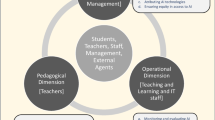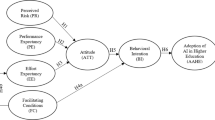Abstract
This article presents the perspectives of science and mathematics teachers on their use of information and communication technology (ICT) in teaching and learning in Tanzania. The findings show that few teachers used computers for teaching and learning purposes while majority of them used computers for administrative purposes. Additionally, teachers were found to have limited confidence in using technology to facilitate specific concepts or skills, to support creativity, and to support students to learn complex concepts. Therefore, it is suggested that schools explore strategies ICT integration strategies that focus more on making a shift from teaching technology or using technology for administrative purpose to appropriate pedagogical uses that could enhance student learning.
Similar content being viewed by others
References
Beauchamp, G., & Parkinson, J. (2008). Pupils’ attitudes towards school science as they transfer from an ict-rich primary school to a secondary school with fewer ict resources: Does ICT matter? Education Information Technology, 13, 103–118.
Beyerbach, B., Walsh, C., & Vannatta, R. (2001). From teaching technology to using technology to enhance student learning: preservice teachers’ changing perceptions of technology infusion. Journal of Teaching and Teacher Education, 9(1), 105–127.
Collis, B., & Moonen, J. (2001). Flexible learning in a digital world: Experiences and expectations. London: Kogan Page. second printing 2002.
Doering, A., Hughes, J., & Huffman, D. (2003). Preservice teachers: Are we thinking with technology? Journal of Research on Technology in Education, 35(3), 342–363.
Ezeife, A. N. (2003). Using the environment in mathematics and science teaching: an African and aboriginal perspective. International Review of Education, 49(3–4), 319–342.
Flick, L., & Bell, R. (2000). Preparing tomorrow’s science teachers to use technology: guidelines for science educators. Contemporary Issues in Technology and Teacher Education, 1(1), 39–60.
Gaible, E., & Burns, M. (2005). Using technology to train teachers: Appropriate uses of ICT in teacher professional development in developing countries. Washington, DC: infoDev/World Bank.
Hare, H. (2007). Survey of ICT in Education in Tanzania. In G. Farrell, S. Isaacs, & M. Trucano (Eds.), Survey of ict and education in Africa (volume 2): 53 country reports. Washington, DC: infoDev/World Bank.
Kafanabo, E. J. (2006). An investigation into interaction between multiple intelligences and performance of learners’ in open-ended digital learning tasks. Pretoria: University of Pretoria.
Kafyulilo, A. (2010). The practical use of ICT in science and mathematics teachers training at DUCE: An analysis of prospective teachers’ Technological Pedagogical Content Knowledge. Unpublished Master Dissertation, Enschede: University of Twente.
Kafyulilo, A. C. (2012). The relevance of authentic learning activities in developing competency and confidence of integrating technology in teaching among pre-service teachers in Tanzania. The African Symposium, 12(1), 99–109.
Keengwe, J. (2007). Faculty integration of technology into instruction and students’ perceptions of computer technology to improve student learning. Journal of Information Technology Education, 6(1), 169–179.
Keong, C., Horani, S., & Daniel, J. (2005). A study on the use of ICT in mathematics teaching. Malaysian Online Journal of Instructional Technology, 2(3), 43–51.
Knezek, G., Christensen, R., & Fluke, R. (2003, April). Testing a Will, Skill, Tool Model of technology integration. Paper Presented at the Annual Meeting of the American Educational Research Association. Chicago, IL.
Koehler, M., & Mishra, P. (2009). What is technological pedagogical content knowledge? Contemporary Issues in Technology and Teacher Education, 9(1), 60–70.
Mambo, H. L. (2001). Tanzania: An overview of information communications technology (ict) development in libraries and information services. International Information & Library Review, 33, 89–96.
Martin, M. O., Mullis, I. S., Foy, P., Olson, F., Preuscho_E, C., Alka, E., et al. (2008). TIMSS 2007 international mathematics report: Findings from IEA’s trends in international mathematics and science study at the fourth and eighth grades. Boston: TIMSS & PIRLS International Study Center.
Mishra, P., & Koehler, M. (2006). Technological pedagogical content knowledge: a framework for teacher knowledge. Teachers College Record, 108(6), 1017–1054.
Niess, M. L. (2005). Preparing teachers to teach science and mathematics with technology: developing a technology pedagogical content knowledge. Teaching and Teacher Education, 21, 509–523.
Niess, M. L., Ronau, R. N., Shafer, K. G., Driskell, S. O., Harper, S. R., Johnston, C., et al. (2009). Mathematics teacher TPACK standards and development model. Contemporary Issues in Technology and Teacher Education, 9(1), 4–24.
OECD (2009). CERI—ICT and initial teachers training. Retrieved from www.oecd.org/edu/nml/itt
Ottevanger, W., van den Akker, J., & de Feiter, L. (2007). Developing science, mathematics, and ICT education in Sub-Saharan Africa: Patterns and promising practices. Washington D.C: The World Bank. World Bank Working Paper No. 101.
Tilya, F. (2003). Teacher support for the use of MBL in activity-based physics teaching in Tanzania. Doctoral dissertation. Enschede: University of Twente.
Tilya, F. (2008). IT and educational policy in the sub-saharan African region. In J. Voogt, & G., Knezek (Eds.), International handbook of information technology in primary and secondary education (pp. 1145–1159).
United Republic of Tanzania [URT]. (2003). National Information and Communication Technology policy. Dar es salaam: Mture Press.
URT. (2007). Information and Communication Technology policy for basic education. Dar es salaam: Ministry of Education and Vocational Training.
URT. (2009). A framework for ICT use in teacher professional development in Tanzania. Dar es Salaam. Retrieved from www.gesci.org/old/files/docman/ICT_TPD_final_Dec_2_09.doc
Vesisenaho, M (2007). Developing university-level introductory ICT education in Tanzania: a contextualized approach. Unpublished PhD Thesis, Joesnsuu: University of Joensuu.
Yuen, A., & Ma, W. (2002). Gender differences in teacher computer acceptance. Journal of Technology and Teacher Education, 10(3), 123–149.
Author information
Authors and Affiliations
Corresponding author
Rights and permissions
About this article
Cite this article
Kafyulilo, A., Keengwe, J. Teachers’ perspectives on their use of ICT in teaching and learning: A case study. Educ Inf Technol 19, 913–923 (2014). https://doi.org/10.1007/s10639-013-9259-7
Published:
Issue Date:
DOI: https://doi.org/10.1007/s10639-013-9259-7




